|
|
|
Sort Order |
|
|
|
Items / Page
|
|
|
|
|
|
|
| Srl | Item |
| 1 |
ID:
168670
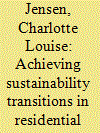

|
|
|
|
|
| Summary/Abstract |
Reducing greenhouse gas emissions in the residential sector is central to European energy policy. However, the speed and scale of sustainable energy transitions need to accelerate. There is a growing consensus that meeting energy targets is highly dependent on interrelated socio-material and cultural aspects of energy use. New ways of framing energy demand that go beyond dominant efficiency- and behavior models are needed. Recognizing these concerns, this paper reports on a review of 1067 Sustainable Energy Consumption Initiatives (SECIs) that aim to reduce residential energy use across 30 European countries. The initiatives are categorized and a corresponding Problem Framing Typology (PFT) is developed, highlighting important aspects of different types of problem framings. The typology contains four categories including 1) Changes in technology; 2) Changes in individual behavior; 3) Changes in everyday life situations; 4) and Changes in complex interactions. Applying the PFT to the 1067 SECIs shows that the vast majority (75%) of SECIs are positioned within category 1 and 2, indicating a lingering bias towards technocratic consumer behavioral strategies. The limitations of such approaches are discussed, and it is argued that systematically addressing interactions between technology, businesses, culture and everyday-life is more likely to lead to long-term transformation.
|
|
|
|
|
|
|
|
|
|
|
|
|
|
|
|
| 2 |
ID:
160117
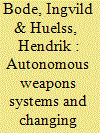

|
|
|
|
|
| Summary/Abstract |
Autonomous weapons systems (AWS) are emerging as key technologies of future warfare. So far, academic debate concentrates on the legal-ethical implications of AWS but these do not capture how AWS may shape norms through defining diverging standards of appropriateness in practice. In discussing AWS, the article formulates two critiques on constructivist models of norm emergence: first, constructivist approaches privilege the deliberative over the practical emergence of norms; and second, they overemphasise fundamental norms rather than also accounting for procedural norms, which we introduce in this article. Elaborating on these critiques allows us to respond to a significant gap in research: we examine how standards of procedural appropriateness emerging in the development and usage of AWS often contradict fundamental norms and public legitimacy expectations. Normative content may therefore be shaped procedurally, challenging conventional understandings of how norms are constructed and considered as relevant in International Relations. In this, we outline the contours of a research programme on the relationship of norms and AWS, arguing that AWS can have fundamental normative consequences by setting novel standards of appropriate action in international security policy.
|
|
|
|
|
|
|
|
|
|
|
|
|
|
|
|
| 3 |
ID:
085810


|
|
|
|
|
| Publication |
2008.
|
| Summary/Abstract |
Implicitly and explicitly, Canadians and Germans look to each other for best practices and lessons learned about politics and policy on such varied topics as approaches to federalism, electoral reform, environmental protection, welfare state reform, education, and immigration and integration.
|
|
|
|
|
|
|
|
|
|
|
|
|
|
|
|
| 4 |
ID:
184641
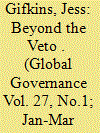

|
|
|
|
|
| Summary/Abstract |
The formal rules governing the UN Security Council offer little insight into how negotiations are conducted on a day-to-day basis. While it is generally assumed that permanent members dominate negotiations, this article investigates avenues for influence for elected members and the UN Secretariat. Institutional power is used to show how permanent members adopt dominant positions in negotiations extending far beyond their Charter-given privileges. Dominance of permanent members is moderated, however, by the legitimacy that support from elected members brings to a resolution. Similarly, the UN Secretariat can use its legitimated authority to influence decisions. The article argues that informal practices are key in understanding how power and influence are allocated in the Council and it forms a building block for future analyses of Security Council practices. This argument also has implications for the perennial reform debates and the prospects for informal reform.
|
|
|
|
|
|
|
|
|
|
|
|
|
|
|
|
| 5 |
ID:
144531
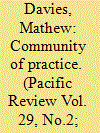

|
|
|
|
|
| Summary/Abstract |
Despite change in the aims, institutions and informal diplomacy of ASEAN since 1997, the formal diplomatic code of conduct remains locked in a traditionalist mode first outlined in the 1970s. Existing approaches from mainstream International Relations theorising are unable to adequately explain this continuity and change. The recent ‘practice turn’ in theorising offers distinct explanatory advantage, which this article illustrates by arguing that the formation of an ‘ASEAN rationality’ between 1967 and 1997 fundamentally curtailed the ability of regional diplomats to revise ASEAN post 1997, resulting in the coexistence of new and old norms in ASEAN's organisation design.
|
|
|
|
|
|
|
|
|
|
|
|
|
|
|
|
| 6 |
ID:
170284
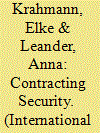

|
|
|
|
|
| Summary/Abstract |
Private military and security companies (PMSCs) are increasingly contracted to provide security in international peacekeeping missions. Yet, we know very little about the practical implications of this development. How do PMSCs reinforce and shape security management within UN peacekeeping operations, and what are the consequences for UN missions and their host populations? To answer these questions, we explore the operational, representative and regulatory security practices in the UN operation in the Democratic Republic of Congo (MONUSCO). Our findings show how seemingly uncontroversial, even benign security practices can have unintended negative consequences. Specifically, we observe that the participation of security firms in MONUSCO's security management contributes to three developments: the differentiation of security between staff and locals, the hardening of MONUSCO's security posture, and the perpetuation of insecurity through the emergence of a local security economy. Contracted security is thus involved in reproducing forms of security that are in some ways diametrically opposed to the aims of the mission to protect civilians and facilitate a sustainable peace.
|
|
|
|
|
|
|
|
|
|
|
|
|
|
|
|
| 7 |
ID:
178562
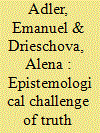

|
|
|
|
|
| Summary/Abstract |
Truth-subversion practices, which populist leaders utilize for political domination, are a significant source of current pressure on the Liberal International Order (LIO). Truth-subversion practices include false speak (flagrant lying to subvert the concept of facts), double speak (intentional internal contradictions in speech to erode reason), and flooding (the emission of many messages into the public domain to create confusion). Aiming to destroy liberal truth ideals and practices, truth subversion weakens epistemological security; that is, the experience of orderliness and safety that results from people's and institutions’ shared understandings of their common-sense reality. It privileges baseless claims over fact-based opinions, thus creating communities of the like-minded between which communication becomes impossible. Truth subversion challenges the LIO's three key institutions: democracy, markets, and multilateralism. If truth-subversion practices prevail, societal polarization, inaccurate information, and emotional inflaming strain democracy and human rights protections. Markets that depend for their functioning on accurate information can falter, and multilateralism that relies on communication and reasoned consensus can decay. International relations (IR) scholarship has recognized knowledge production practices as a key feature underlying the LIO, but has not yet identified challenges to those practices as a threat for the LIO. We discuss what the discipline can do to alleviate its blind spots.
|
|
|
|
|
|
|
|
|
|
|
|
|
|
|
|
| 8 |
ID:
175119
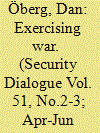

|
|
|
|
|
| Summary/Abstract |
This article analyzes how contemporary military training and exercises shape and reify specific modalities of war. Historically, military training has shifted from being individual- and experience-oriented, towards becoming modelled into exercise environments and practices. Drawing on semi-structured interviews with military officers, exercise controllers, and war-game designers, the article distinguishes between tactical training, characterized by military functions embodied through weapon platforms in a demarcated battlespace, and operational training, characterized by administrative and organizational processes embodied through self-referential staff routines. As military exercises integrate the tactical and operational dimensions into a model for warfare, they serve as blueprints for today’s battles at the same time as they perpetuate a martial viewpoint of the world. As a result, preparations for potential future conflicts constitute a fertile ground for apprehending the becoming of war.
|
|
|
|
|
|
|
|
|
|
|
|
|
|
|
|
| 9 |
ID:
165112
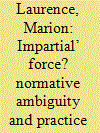

|
|
|
|
|
| Summary/Abstract |
Impartiality is a core legitimating norm for United Nations peace operations. Yet beliefs about what that norm requires of UN personnel have shifted dramatically. In 2013, for example, the Security Council created an intervention brigade – composed of infantry battalions, special forces, and an artillery company – to ‘neutralize’ non-state armed groups in the Democratic Republic of the Congo (DRC). According to critics, these activities violate core peacekeeping norms, including impartiality. This criticism elicits a puzzling response from many UN officials. They downplay the novelty of new practices, insisting that they are still ‘impartial’. Where does this discursive pattern come from, and what does it tell us about the relationship between day-to-day practices and the norms that ostensibly guide UN peace operations? Drawing on evidence from the DRC, I argue that norms like impartiality may endure – and remain rhetorically powerful – without telling us much about how practices on the ground have evolved. Instead, insisting that new practices are impartial can be a way for UN personnel to stabilize a core part of their identity under conditions of normative ambiguity. It can also be a way of glossing over contestation and pre-empting concerns about partiality in UN peace operations.
|
|
|
|
|
|
|
|
|
|
|
|
|
|
|
|
| 10 |
ID:
174705
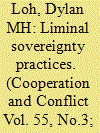

|
|
|
|
|
| Summary/Abstract |
Sovereignty is the core concept of international relations. Almost without exception, approaches to sovereignty in IR have followed a binary framing where sovereignty is seen to consist of two components: ‘internal’ versus ‘external’ sovereignty, ‘positive’ versus ‘negative’ sovereignty, and so on. These dichotomies stem from the prevailing understanding of sovereignty as the boundary between the inside and the outside of the state. This article builds on and expands these existing approaches by reconceptualizing the sovereign border line as a liminal border space. Relatedly, we theorize the concept of liminality in greater depth by distinguishing between four distinct kinds of liminality: marginal, hybrid, interstitial, and external. Each of these problematizes the dividing line of sovereignty in unique but comparable ways. We empirically illustrate these four kinds of liminality with reference to contested states, ‘tribal’ or ‘indigenous’ groups, NGOs such as Amnesty International, and extremist groups such as ISIS, respectively. Each of these types of liminality entails unique actors, practices, and consequences for the concept of sovereignty. We suggest that liminal sovereignty practices represent the most radical source of change for the concept of sovereignty, yet at the same time, somewhat counterintuitively, they also serve as the best means of clarifying existing, established meanings and practices of sovereignty.
|
|
|
|
|
|
|
|
|
|
|
|
|
|
|
|
| 11 |
ID:
114861
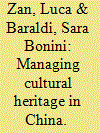

|
|
|
|
|
| Publication |
2012.
|
| Summary/Abstract |
This article investigates change processes regarding the managerial aspects of organizing cultural heritage activities in China. The focus is not on the historical and artistic meanings of archaeological discoveries in themselves; nor on the technical, scientific and methodological repercussions of conservation and restoration; nor on the evolution of museology per se. Rather, the core of the analysis is on new managerial problems along the "archaeological chain" (archaeological discoveries, restoration, museum definition and public access to cultural heritage) posed by new professional discourse and the overall evolution of the economic and political context. The article is based on field research carried out in Luoyang, Henan province. The micro view adopted (managing practices more than policies), and the unusual access to data (including financial figures on individual entities) represent a unique opportunity for a sort of "journey" inside the Chinese public sector.
|
|
|
|
|
|
|
|
|
|
|
|
|
|
|
|
| 12 |
ID:
181423
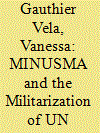

|
|
|
|
|
| Summary/Abstract |
MINUSMA, the UN peace operation in Mali, represents a new development in peace missions, due to the insecure transnational context in which it has evolved and its mandate to collaborate with counterterrorist forces in the region. The goal of this paper is to study this new development, using Enloe’s feminist theorization of the concept of militarization. I base my analysis on an understanding of militarization as a social process that can be adapted or contested. Grounded in a qualitative methodology, I study MINUSMA and its peacekeepers in order to identify how the process of militarization takes place within/through the mission. My principal argument is that the context of robust peacekeeping, combined with the implications of collaboration with counterterrorist operations and the reengagement of NATO troop contributing countries, creates a space in which militarization is reinforced for the mission and its peacekeepers and that this impacts how they interact with one another and what practices they favour.
|
|
|
|
|
|
|
|
|
|
|
|
|
|
|
|
| 13 |
ID:
144071
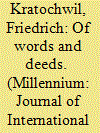

|
|
|
|
|
| Summary/Abstract |
In this response, I answer some of the critiques that were raised in the Forum. In particular, this response clarifies the role of practices and pragmatism, the limits of inter-disciplinarity, and the authority and assumed foundations of law in a post-foundational time. Even though this contribution does not attempt to solve these issues once and for all, it provides avenues for future engagement.
|
|
|
|
|
|
|
|
|
|
|
|
|
|
|
|
| 14 |
ID:
132337
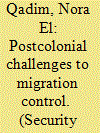

|
|
|
|
|
| Publication |
2014.
|
| Summary/Abstract |
Analyses that develop a postcolonial critique of international relations and security studies have outlined the project of 'decolonizing' these disciplines and have underlined the importance of taking into account actors from the South. I seek to do so here through the study of migration policies, in particular by looking for the agency of state actors in so-called countries of origin. This article shows that the study of practices of cooperation is a good strategy for decolonizing the study of international relations. Based upon the example of mid-level cooperation on deportation between France and Morocco, this article focuses on two devices and the practices used for international cooperation on migration controls: the posting of immigration liaison officers and the statistical evaluation of cooperation. This case study shows that such practices open brokering spaces in the transnational security field and allow state actors from the South to challenge the dominance of the North.
|
|
|
|
|
|
|
|
|
|
|
|
|
|
|
|
| 15 |
ID:
144070
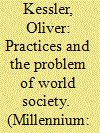

|
|
|
|
|
| Summary/Abstract |
This contribution explores The Status of Law in World Society by looking at the practice turn in particular. Without challenging Kratochwil’s interest in practices per se, this contribution poses two questions: first, it acknowledges that the ‘practice turn’ itself is, like every intellectual movement, ambiguous with conflicting trends and developments. One of these ambiguities, however, concerns the position of the observer. Leaving this position undefined, the practice turn transports this ambiguity into constructivism with important repercussions on what constructivists assume to know and where the boundaries of their possible critique are. Second, this contribution asks whether there is a conflict between an interest in practices and the question of order. In particular, the latter incorporates the question of the ‘third’ that Kratochwil acknowledges, but does not develop in more detail.
|
|
|
|
|
|
|
|
|
|
|
|
|
|
|
|
| 16 |
ID:
113848
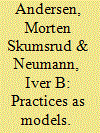

|
|
|
|
|
| Publication |
2012.
|
| Summary/Abstract |
The everyday meaning of 'practice' is something like concrete 'doings' or 'what is being done' in a social setting. Its everyday counter-concept is theory. Intuitively, this may lead us to think of practices as what is really going on in the world, as opposed to theories or models. This commonsensical meaning of practices reinforces the separation between theory and empirical reality. We argue that such an understanding has informed much of the ongoing 'practice turn' in International Relations. We also argue that this is not necessarily an efficient way of conceptualising 'practices', because practices might end up being too general a concept to be analytically useful. To counter this, we argue, one must be explicit about practices at the level of models, that is, in fictional representations of the world. This can help in studying them as endogenous phenomena, and not only as the practical counterpart of some other phenomena, or emanating from unspoken theoretical assumptions of, for example, conscious rule-following behaviour, interests, identities, structures and so on. As an illustration of what a model of practice might look like, we include a case study of Iroquois diplomacy as practice. Using a model, without relying on unstated assumptions exogenous to it, we represent this particular case through assuming that both the agents and their social environments emerge through practices.
|
|
|
|
|
|
|
|
|
|
|
|
|
|
|
|
| 17 |
ID:
168864
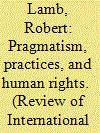

|
|
|
|
|
| Summary/Abstract |
This article is an intervention in recent debates about conceptual and normative theorisations of human rights, which have been increasingly characterised by a divide between ‘moral’ and ‘practice-based’/’political’ understandings. My aim is to articulate an alternative, pragmatist understanding of human rights, one that is importantly distinct from the practice-based account with which it might be thought affiliated. In the first part of the article, I reveal the fundamental flaw in the practice-based account of human rights: I argue that it is undermined by the ontological thesis at its heart, which naturalises and reifies political arrangements and institutions that are radically contingent. In the second part, I identify, and outline the attractiveness of, a pragmatist normative account of human rights. In contrast to the practice-based approach, this pragmatist account construes human rights in ideational terms. The pragmatist understanding accepts both the contingency of our practices and the cultural limits to moral justification, while nevertheless retaining a commitment to the enterprise of normative philosophical conversation. I argue, in contrast to prevailing interpretations, that the international theory advanced by John Rawls exemplifies a pragmatist account of human rights and points a way forward for theoretically fruitful but appropriately circumscribed analysis of the concept.
|
|
|
|
|
|
|
|
|
|
|
|
|
|
|
|
| 18 |
ID:
174706
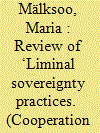

|
|
|
|
|
| Summary/Abstract |
The online publication of the article ‘Liminal sovereignty practices: Rethinking the inside/outside dichotomy’ moves away from the standard depiction of sovereignty as operating on the line between the inside and the outside of the state (Loh and Heiskanen, 2020). The authors seek to reconceptualize the said dividing line (border line) as a liminal space (border space) and, by extension, theorize the concept of liminality in greater depth and nuance. Sovereignty is accordingly taken to be grounded in three distinct spaces (the domestic society, the international realm and the liminal space between the two), loaded with various sovereignty practices. Liminality is theorized as an attribute of sovereignty. The authors offer a systematization of various ambiguous types of ‘borderline’ sovereignty, contesting the standard notions and practices of sovereignty to varying degrees. The article distinguishes between four distinct kinds of liminality: marginal (e.g., contested states); hybrid (e.g., indigenous peoples/tribal sovereignty); interstitial (e.g., non-state actors); and external (e.g., terrorists and anarchists) liminality – each with unique actors, practices and consequences for the concept of sovereignty.
|
|
|
|
|
|
|
|
|
|
|
|
|
|
|
|
| 19 |
ID:
174707
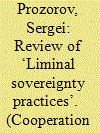

|
|
|
|
|
| Summary/Abstract |
I recommend that the article should be revised and resubmitted. This is a very well-written and clearly argued piece that offers a systematic and analytical treatment of the concept of liminality that the authors suggest as an alternative to the binary inside/outside thinking that characterizes both the traditional international relations (IR) theory and its post-structuralist critique that remains fixated on the dividing line between the inside and the outside, even as it affirms its contingency, fluidity, haziness, and so on. While the authors’ argument, particularly their typology of liminal practices, is very interesting and suggestive, I am not certain that it succeeds in solving the problems the authors claim it does, at least on the level they claim it does. Below I address three problems with the argument.
|
|
|
|
|
|
|
|
|
|
|
|
|
|
|
|
| 20 |
ID:
144217
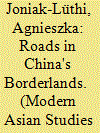

|
|
|
|
|
| Summary/Abstract |
Since the beginning of the twenty-first century, the tarmac road network in Xinjiang Uyghur Autonomous Region in northwest China has been greatly expanded. The total length of roads increased from about 30,000 kilometres in 1999 to more than 146,000 kilometres in 2008. Though roads are considered by the state to be instruments of economic development, in multi-ethnic border regions like Xinjiang, the role of an efficient road network in the construction of the Chinese state's imaginary ‘bounded space’ is arguably just as crucial. With the help of Lefebvre's (1991) and Soja's (1999) conceptualization of space, this article explores the multiple spatial figurations of which roads are a part in Xinjiang. The article starts from ‘the mappable’ dimension of the expanding road network, and moves on to discuss perceptions and representations related to this expansion, before finally discussing how individuals creatively explore its fissures and hidden pockets.
|
|
|
|
|
|
|
|
|
|
|
|
|
|
|
|
|
|
|
|
|